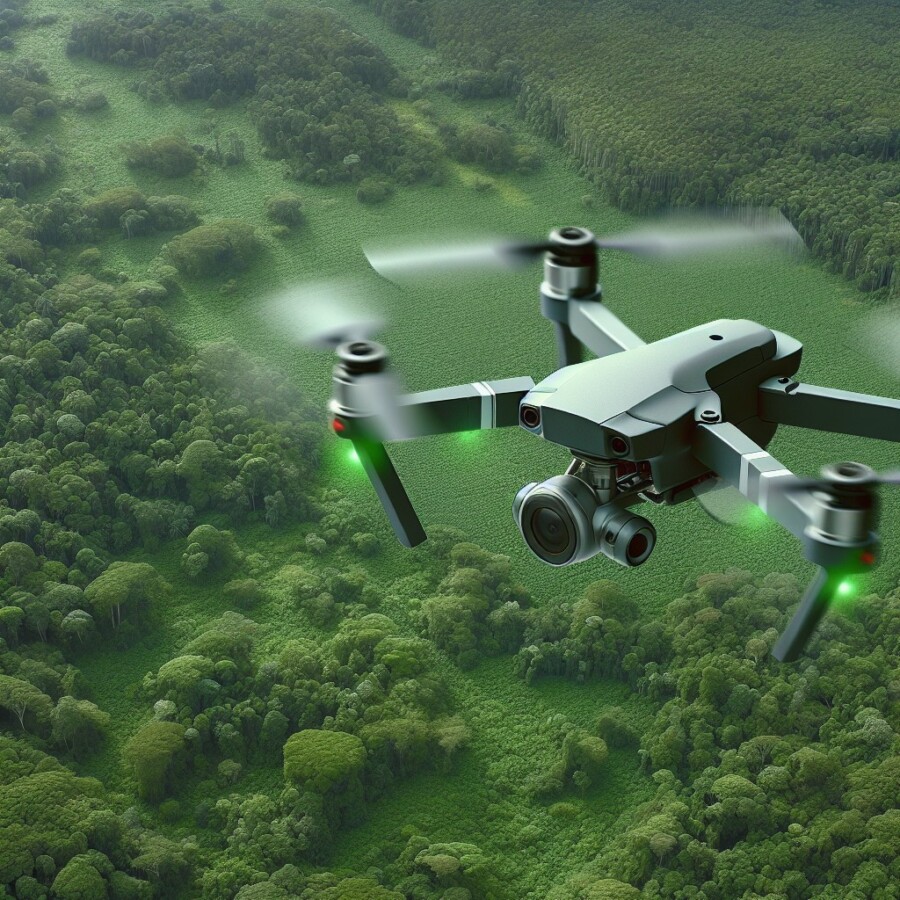A dog named Ulysse went missing in Bedfordshire, England. But after 12 days, the dog was found and brought back to its family. How? Well, a special camera attached to a drone helped in the rescue. The camera could see Ulysse’s body heat, so even though he was hiding in a hedge, they could find him. The charity called Drone to Home did the rescue, and now Ulysse’s owner, Sam Boyle, is raising money for the charity to get another drone to help find more lost pets.
This story shows how cool technology can be when it comes to finding lost animals. The special camera on the drone could see Ulysse’s body heat, which made it easier to find him, even in a thick bush. This new way of searching for lost pets has been really successful in bringing them back to their families.
Using drones with special cameras has become more popular lately. They’re not just for finding lost pets, but also for other things like searching for people in emergencies, keeping an eye on animals in the wild, and even helping with putting out fires. The special cameras on these drones can see heat, so they’re really helpful when it’s hard to see or when you’re looking for someone or something in a tough place.
Ulysse’s rescue reminds us how important it is to support charities and groups that use cool technology to help both people and animals. By giving to these causes, we can make sure that more lost pets are found and brought back to their families. Using drones with special cameras is a great way to search for lost animals, and it gives hope and relief to those who have lost their furry friends.
Original news source: Missing dog found using thermal drone in Bedfordshire (BBC)
🎧 Listen:
Slow
Normal
Fast
📖 Vocabulary:
| 1 | Ulysse | The name of the lost dog in the story |
| 2 | Bedfordshire | A county in England where the dog went missing |
| 3 | drone | A flying robot that can be controlled from the ground |
| 4 | hedge | A line of closely planted shrubs or low-growing trees forming a fence or boundary |
| 5 | charity | An organization that helps people or animals and doesn’t make money from it |
| 6 | technology | The use of scientific knowledge for practical purposes, especially in industry |
| 7 | bush | A dense group of shrubs or small trees |
| 8 | searching | The process of trying to find something or someone |
| 9 | emergencies | Serious, unexpected, and often dangerous situations requiring immediate action |
| 10 | wildlife | Animals living in their natural environment |
| 11 | fires | Combustions that are destructive and uncontrolled |
| 12 | heat | The warmth or energy that comes from something |
| 13 | tough | Difficult or challenging |
| 14 | causes | Reasons or motivations for supporting something |
| 15 | relief | A feeling of comfort when a pain or worry is taken away |
Group or Classroom Activities
Warm-up Activities:
– News Summary
Instructions:
1. Divide the class into small groups.
2. Provide each group with a copy of the article.
3. Instruct the groups to read the article together and summarize the main points in a paragraph or two.
4. After a designated amount of time, have each group share their summary with the rest of the class.
5. Facilitate a discussion about the article, asking questions such as “What do you think about using drones to find lost pets?” or “Do you think this technology could be used for other purposes?”
– Opinion Poll
Instructions:
1. Write the following question on the board: “Do you think using drones to find lost pets is a good idea? Why or why not?”
2. Instruct the students to think about their opinion and come up with at least three reasons to support their stance.
3. Divide the class into pairs or small groups.
4. Have the students discuss their opinions and reasons with their partners or group members.
5. After a designated amount of time, ask for volunteers to share their opinions with the rest of the class.
– Vocabulary Pictionary
Instructions:
1. Write a list of vocabulary words from the article on the board (e.g. drone, rescue, charity, camera, heat).
2. Divide the class into pairs or small groups.
3. Instruct each pair/group to choose one word from the list and create a simple drawing to represent the word.
4. Give the students a designated amount of time to complete their drawings.
5. After the time is up, have each pair/group take turns presenting their drawing to the rest of the class. The other students must guess which word the drawing represents.
– Pros and Cons
Instructions:
1. Divide the class into two groups.
2. Assign one group to come up with a list of pros (advantages) of using drones to find lost pets, and the other group to come up with a list of cons (disadvantages).
3. Give the groups a designated amount of time to brainstorm and write down their ideas.
4. After the time is up, have each group share their lists with the rest of the class.
5. Facilitate a discussion about the pros and cons, encouraging students to express their opinions and debate the topic.
– Future Predictions
Instructions:
1. Instruct the students to imagine that it is 10 years in the future.
2. Divide the class into pairs or small groups.
3. Ask the students to discuss and predict how technology, such as drones with special cameras, might be used to help find lost pets in the future.
4. Give the students a designated amount of time to brainstorm and discuss their predictions.
5. After the time is up, ask for volunteers to share their predictions with the rest of the class. Encourage creative and imaginative ideas.
🤔 Comprehension Questions:
1. How was Ulysse found after he went missing?
2. What kind of camera was attached to the drone?
3. How did the camera help in finding Ulysse?
4. What is the name of the charity that did the rescue?
5. What is Sam Boyle doing to help the charity?
6. Why is using drones with special cameras helpful in finding lost pets?
7. Besides finding lost pets, what are some other uses for drones with special cameras?
8. Why is it important to support charities and groups that use cool technology to help people and animals?
Go to answers ⇩
🎧✍️ Listen and Fill in the Gaps:
A dog named Ulysse went missing in Bedfordshire, England. But after 12 days, the dog was found and brought back to its family. How? Well, a special camera (1)______ to a drone (2)______ in the rescue. The camera could see Ulysse’s body heat, so even though he was hiding in a (3)______, they could find him. The charity called (4)______ to Home did the rescue, and now Ulysse’s owner, Sam Boyle, is raising money for the charity to get another drone to help find more lost pets.
This story shows how cool technology can be when it (5)______ to finding lost (6)______. The special (7)______ on the drone could see Ulysse’s body heat, which made it easier to find him, even in a thick bush. This new way of searching for lost pets has been really successful in (8)______ them back to their families.
Using drones with special (9)______ has become more popular lately. They’re not just for finding lost pets, but also for (10)______ things like searching for people in emergencies, keeping an eye on animals in the wild, and even (11)______ with (12)______ out fires. The special cameras on these drones can see heat, so they’re really helpful when it’s hard to see or when you’re looking for someone or something in a tough place.
Ulysse’s rescue reminds us how important it is to (13)______ charities and groups that use cool technology to help both people and animals. By (14)______ to these causes, we can make sure that more lost pets are found and (15)______ back to their families. (16)______ drones with special cameras is a great way to search for lost animals, and it gives hope and relief to those who have lost their furry friends.
Go to answers ⇩
💬 Discussion Questions:
Students can ask a partner these questions, or discuss them as a group.
1. What is a drone?
2. How do you think Ulysse’s family felt when they found him after 12 days?
3. Do you like the idea of using drones to find lost pets? Why or why not?
4. How would you feel if your pet went missing?
5. Do you think using drones with special cameras is a good way to search for lost animals? Why or why not?
6. What other ways can you think of to find lost pets?
7. Have you ever lost a pet? How did you feel?
8. Do you think it’s important to support charities that use technology to help animals? Why or why not?
9. How do you think the special camera on the drone helped in finding Ulysse?
10. Do you think using drones with special cameras is a good way to help find people in emergencies? Why or why not?
11. Have you ever seen a drone in real life? What was your impression?
12. How do you think Ulysse’s owner felt when the drone found him?
13. What other ways can you think of to use drones with special cameras?
14. Do you think using drones with special cameras is a good way to keep an eye on animals in the wild? Why or why not?
15. Why do you think it’s important to bring lost pets back to their families?
Individual Activities
📖💭 Vocabulary Meanings:
Match each word to its meaning.
Words:
1. Ulysse
2. Bedfordshire
3. drone
4. hedge
5. charity
6. technology
7. bush
8. searching
9. emergencies
10. wildlife
11. fires
12. heat
13. tough
14. causes
15. relief
Meanings:
(A) Serious, unexpected, and often dangerous situations requiring immediate action
(B) A dense group of shrubs or small trees
(C) Difficult or challenging
(D) A line of closely planted shrubs or low-growing trees forming a fence or boundary
(E) Animals living in their natural environment
(F) A flying robot that can be controlled from the ground
(G) A feeling of comfort when a pain or worry is taken away
(H) An organization that helps people or animals and doesn’t make money from it
(I) The use of scientific knowledge for practical purposes, especially in industry
(J) Reasons or motivations for supporting something
(K) Combustions that are destructive and uncontrolled
(L) The warmth or energy that comes from something
(M) The process of trying to find something or someone
(N) The name of the lost dog in the story
(O) A county in England where the dog went missing
Go to answers ⇩
🔡 Multiple Choice Questions:
1. How did the special camera on the drone help find Ulysse?
(a) It could see through hedges
(b) It could hear his barking
(c) It could see his body heat
(d) It could track his scent
2. What is the name of the charity that did the rescue?
(a) Drone to Home
(b) Pet Finders
(c) Lost Pets Rescue
(d) Animal Search Team
3. What is the main purpose of using drones with special cameras?
(a) To take aerial photographs
(b) To find lost pets and people
(c) To monitor traffic
(d) To deliver packages
4. What can the special cameras on the drones see?
(a) Sound
(b) Heat
(c) Color
(d) Movement
5. What other uses are there for drones with special cameras?
(a) Searching for people in emergencies
(b) Monitoring wild animals
(c) Assisting with firefighting
(d) All of the above
6. How does Ulysse’s rescue show the importance of supporting charities?
(a) It helps fund the purchase of more drones
(b) It raises awareness about the use of technology
(c) It shows the impact of donations on animal welfare
(d) It brings lost pets back to their families
7. What does the article suggest about using drones with special cameras?
(a) It is a dangerous and unreliable method
(b) It is only used for searching for people
(c) It is a successful way to find lost pets
(d) It is a recent development in technology
8. What is the main message of the article?
(a) Ulysse’s rescue was a unique case
(b) Drones are only used for recreational purposes
(c) Donating to charities is not important
(d) Using drones with special cameras can help find lost pets
Go to answers ⇩
🕵️ True or False Questions:
1. The camera could detect Ulysse’s body heat, allowing them to find him even when he was hiding in a hedge.
2. Ulysse’s owner, Sam Boyle, is raising money for the charity to acquire another drone for finding lost pets.
3. A cat named Ulysse was missing in Bedfordshire, England.
4. Ulysse was found and brought back to his family after 12 days.
5. The charity called Drone to Home did not conduct the rescue.
6. A special camera attached to a drone helped in the rescue.
7. Drones with special cameras have become less popular for various purposes, including finding lost pets, searching for people in emergencies, monitoring wildlife, and assisting in firefighting.
8. Not supporting charities and groups that use technology like drones can help ensure more lost pets are reunited with their families.
Go to answers ⇩
📝 Write a Summary:
Write a summary of this news article in two sentences.
Check your writing now with the best free AI for English writing!
Writing Questions:
Answer the following questions. Write as much as you can for each answer.
Check your answers with our free English writing assistant!
1. How did the special camera on the drone help find Ulysse?
2. What other uses do drones with special cameras have besides finding lost pets?
3. Why is it important to support charities and groups that use cool technology?
4. How can using drones with special cameras give hope and relief to people who have lost their pets?
5. What is Sam Boyle doing to help the charity Drone to Home?
✅ Answers
🤔✅ Comprehension Question Answers:
1. How was Ulysse found after he went missing?
Ulysse was found using a special camera attached to a drone.
2. What kind of camera was attached to the drone?
The drone had a special camera that could see Ulysse’s body heat.
3. How did the camera help in finding Ulysse?
The camera helped in finding Ulysse because it could see his body heat, even when he was hiding in a hedge.
4. What is the name of the charity that did the rescue?
The charity that did the rescue is called Drone to Home.
5. What is Sam Boyle doing to help the charity?
Sam Boyle is raising money for the charity to get another drone to help find more lost pets.
6. Why is using drones with special cameras helpful in finding lost pets?
Using drones with special cameras is helpful in finding lost pets because the cameras can see heat, making it easier to find them even in difficult places.
7. Besides finding lost pets, what are some other uses for drones with special cameras?
Some other uses for drones with special cameras include searching for people in emergencies, monitoring animals in the wild, and assisting with firefighting.
8. Why is it important to support charities and groups that use cool technology to help people and animals?
It is important to support charities and groups that use cool technology to help people and animals because they provide hope and relief to those in need. By giving to these causes, we can ensure that more lost pets are found and reunited with their families.
Go back to questions ⇧
🎧✍️✅ Listen and Fill in the Gaps Answers:
(1) attached
(2) helped
(3) hedge
(4) Drone
(5) comes
(6) animals
(7) camera
(8) bringing
(9) cameras
(10) other
(11) helping
(12) putting
(13) support
(14) giving
(15) brought
(16) Using
Go back to questions ⇧
📖💭✅ Vocabulary Meanings Answers:
1. Ulysse
Answer: (N) The name of the lost dog in the story
2. Bedfordshire
Answer: (O) A county in England where the dog went missing
3. drone
Answer: (F) A flying robot that can be controlled from the ground
4. hedge
Answer: (D) A line of closely planted shrubs or low-growing trees forming a fence or boundary
5. charity
Answer: (H) An organization that helps people or animals and doesn’t make money from it
6. technology
Answer: (I) The use of scientific knowledge for practical purposes, especially in industry
7. bush
Answer: (B) A dense group of shrubs or small trees
8. searching
Answer: (M) The process of trying to find something or someone
9. emergencies
Answer: (A) Serious, unexpected, and often dangerous situations requiring immediate action
10. wildlife
Answer: (E) Animals living in their natural environment
11. fires
Answer: (K) Combustions that are destructive and uncontrolled
12. heat
Answer: (L) The warmth or energy that comes from something
13. tough
Answer: (C) Difficult or challenging
14. causes
Answer: (J) Reasons or motivations for supporting something
15. relief
Answer: (G) A feeling of comfort when a pain or worry is taken away
Go back to questions ⇧
🔡✅ Multiple Choice Answers:
1. How did the special camera on the drone help find Ulysse?
Answer: (c) It could see his body heat
2. What is the name of the charity that did the rescue?
Answer: (a) Drone to Home
3. What is the main purpose of using drones with special cameras?
Answer: (b) To find lost pets and people
4. What can the special cameras on the drones see?
Answer: (b) Heat
5. What other uses are there for drones with special cameras?
Answer: (a) Searching for people in emergencies
6. How does Ulysse’s rescue show the importance of supporting charities?
Answer: (d) It brings lost pets back to their families
7. What does the article suggest about using drones with special cameras?
Answer: (c) It is a successful way to find lost pets
8. What is the main message of the article?
Answer: (d) Using drones with special cameras can help find lost pets
Go back to questions ⇧
🕵️✅ True or False Answers:
1. The camera could detect Ulysse’s body heat, allowing them to find him even when he was hiding in a hedge. (Answer: True)
2. Ulysse’s owner, Sam Boyle, is raising money for the charity to acquire another drone for finding lost pets. (Answer: True)
3. A cat named Ulysse was missing in Bedfordshire, England. (Answer: False)
4. Ulysse was found and brought back to his family after 12 days. (Answer: True)
5. The charity called Drone to Home did not conduct the rescue. (Answer: False)
6. A special camera attached to a drone helped in the rescue. (Answer: True)
7. Drones with special cameras have become less popular for various purposes, including finding lost pets, searching for people in emergencies, monitoring wildlife, and assisting in firefighting. (Answer: False)
8. Not supporting charities and groups that use technology like drones can help ensure more lost pets are reunited with their families. (Answer: False)
Go back to questions ⇧















